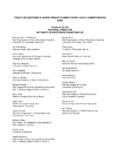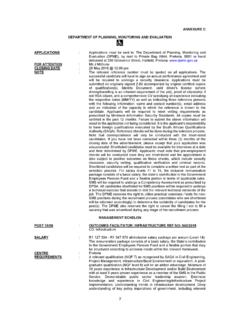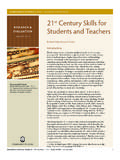Transcription of G20/OECD INFE
1 G20/OECD INFE core competencies framework ON financial literacy FOR ADULTSG20/OECD INFE core competencies framework ON financial literacy FOR ADULTS 1G20/OECD INFE core competencies framework ON financial literacy FOR ADULTSG20/OECD INFE core competencies framework ON financial literacy FOR ADULTSG20/OECD INFE core competencies framework ON financial literacy FOR ADULTS2 Please cite this publication as:OECD (2016), G20/OECD INFE core competencies framework on fi nancial literacy for adultsThis document is published on the responsibility of the Secretary-General of the OECD.
2 The opinions expressed and arguments employed herein do not necessarily refl ect the offi cial views of OECD member countries. This document and any map included herein are without prejudice to the status of or sovereignty over any territory, to the delimitation of international frontiers and boundaries and to the name of any territory, city or in response to a call from G20 Leaders in 2013, this policy tool builds on OECD International Network on financial Education (OECD/INFE) work on core competencies for youth and extensive work on measuring the fi nancial literacy of youth and adults as well as national frameworks and expert feedback from members of the OECD/INFE.
3 In particular, it uses the same content categories as the PISA fi nancial literacy assessment framework and the youth core competencies framework . Consistent with the OECD defi nitions of fi nancial education and fi nancial literacy acknowledged by G20 leaders, it focuses separately on knowledge, behaviour and attitudes; an approach also taken in the OECD/INFE fi nancial literacy measurement work and the youth core competencies framework . The framework draws on the fi ndings of other OECD/INFE outputs, including work on fi nancial education for long-term savings and investment and work on vulnerable groups.
4 The overall structure and content of the framework was approved by the OECD/INFE in Amsterdam in April 2016. In July 2016 the OECD/INFE and OECD bodies in charge of fi nancial education [Committee on financial Markets and Insurance and Private Pensions Committee] approved the fi nal version for circulation to the G20 Global Partnership for financial Inclusion and G20 Leaders, as well as for INFE core competencies framework ON financial literacy FOR ADULTSG20/OECD INFE core competencies framework ON financial literacy FOR ADULTS 3 core competencies framework ON financial literacy FOR ADULTS This document contains an outcome-based core competencies framework on financial literacy for adults, developed by the OECD International Network on financial Education (OECD/INFE)
5 In response to a call from G20 Leaders in policy tool highlights a range of financial literacy outcomes that may be considered to be universally relevant and important to sustain or improve financial well-being in everyday life. It describes the types of knowledge that adults aged 18 or over could benefit from, what they should be capable of doing and the behaviours that may help them to achieve financial well-being, as well as the attitudes and confidence that will support this process. It can be used to inform the development of a national strategy on financial education, improve programme design, identify gaps in provision, and create assessment, measurement and evaluation adult framework complements the OECD/INFE core competencies framework on financial literacy for Youth developed in 2015, taking into account the wider use of traditional and new types of financial services, including digital financial services.
6 The more complex and often urgent financial decisions made by adults and the broader range of knowledge and increased confidence required in adulthood to achieve financial framework provides guidance on the breadth of financial literacy that could be covered within a national strategy and the content design of financial education initiatives, and indicates areas to be assessed as part of an evaluation strategy. It highlights aspects of financial behaviour that can be more efficiently addressed through better product design, consumer protection and/or regulation.
7 This approach is consistent with the global and increasingly digital nature of the financial services industry, the mobility of populations and expectations that financial services regulation and financial consumer protection frameworks will be aligned internationally. G20/OECD INFE core competencies framework ON financial literacy FOR ADULTS4 Table of contents1. OBJECTIVES AND KEY COMPONENTS 5An international framework 5 Taking into account needs and priorities 5 Complementarity with the youth framework 52.
8 G20/OECD INFE core competencies framework ON financial literacy FOR ADULTS 6 Characteristics of the framework 6 Comprehensive coverage 6 Structure of the framework 6 How to read the framework 7A. Money and transactions 8B. Planning and managing finances 12C. Risk and reward 23D. financial landscape 25 ANNEX: MAPPING EXISTING FRAMEWORKS 30 TABLE: core competencies frameworks for adults and related documents 32G20/OECD INFE core competencies framework ON financial literacy FOR ADULTSG20/OECD INFE core competencies framework ON financial literacy FOR ADULTS 5AN INTERNATIONAL FRAMEWORKIn 2013, G20 leaders called on the OECD/INFE to develop core competencies frameworks on financial literacy for both youth and adults.
9 This document presents the G20/OECD INFE core competencies framework on financial literacy for Adults. It highlights a range of financial literacy outcomes that may be considered to be universally relevant or important for financial well-being in everyday life. It describes the types of knowledge that adults aged 18 or over could benefit from, what they should be capable of doing and behaviours that may help to sustain or improve financial well-being, as well as the attitudes and confidence that will support this process.
10 It can be used to inform the development of a national strategy on financial education, improve programme design, identify gaps in provision, and create assessment, measurement and evaluation tools. The framework is intended to be read as a high-level overview of core financial literacy competencies . As with any other skill, it is unlikely that any one person will exhibit each competency and there is no expectation that individuals should aspire to having all of the competencies listed. However, it is anticipated that a combination of these competencies , based on personal needs and the cultural and economic context, is likely to maintain or improve the financial well-being of an extent to which people are financially included and confident using financial products and services will impact on their knowledge, behaviour and attitudes, indicating that access to appropriate financial products and services is a pre-requisite for some of the core competencies indicated.

















